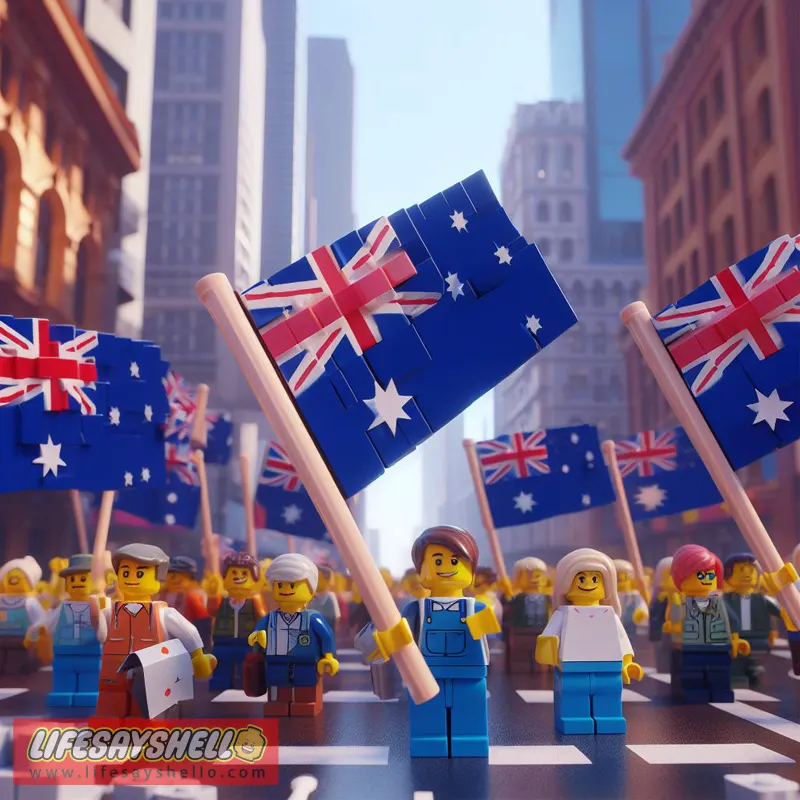The Complex History and Meaning of Australia Day

Every year on January 26, Australians come together to celebrate their national day, known as Australia Day. But why is this particular date so significant? And why does it spark debate each year? Grab a cuppa and let’s dive into the complex backstory of Australia Day.
The Arrival of the First Fleet
It all started on January 26, 1788, when the First Fleet of 11 British ships sailed into Sydney Cove. Led by Captain Arthur Phillip, the ships carried over 1000 British passengers tasked with establishing a penal colony in New South Wales.
As the ships dropped anchor, Captain Phillip rowed ashore and raised the British flag, signalling the beginning of British colonisation in Australia. Originally, this date was known as “First Landing Day” or “Foundation Day” and marked the first permanent European settlement on Aussie soil.
From First Landing to Australia Day
In the early 1800s, January 26 celebrations kicked off in Sydney to mark the colony’s beginnings. They were informal affairs with drinking, merriment and a bit of chaos!
By 1818, First Landing Day was an official public holiday in NSW. Regattas, sporting events, balls and anniversary dinners became popular ways to celebrate.
It wasn’t until 1935 that all Aussie states adopted January 26 as a unified public holiday named “Australia Day”. This was a milestone moment bringing together the nation to reflect on its history and progress.
What Does Australia Day Represent?
For many modern Australians, January 26 is a day to celebrate the founding of the first permanent European settlement Down Under. It recognises the sacrifices of the early British settlers who built the foundations of modern Australia.
Australia Day also commemorates the establishment of government institutions, democracy and the rule of law. It’s a chance to reflect on how far the nation has come in building an open, diverse and prosperous society.
Public celebrations aim to showcase Australia’s history, culture and achievements. It’s an opportunity to consider what it means to be Australian in today’s society. The day looks towards the nation’s future, expressing optimism and encouragement for the road ahead.
A Day of Mourning for Indigenous Australians
But not all Australians celebrate on January 26. For many Indigenous Australians, the date represents the beginning of dispossession, disease and devastation.
The arrival of the First Fleet brought immense hardship to the hundreds of thousands of Aboriginal and Torres Strait Islander people already living in Australia. Colonisation led to the spread of European diseases, loss of land and food sources, massacres and violent conflict.
Because of this tragic history, Indigenous leaders in the 1930s declared January 26 a Day of Mourning. Today, many refer to January 26 as “Invasion Day” or “Survival Day” and mark it as a protest. The date reflects the invasion of Aboriginal land and the ongoing impacts of colonisation.
The Debate: Should the Date Change?
Given the conflicting meanings of January 26, debate continues around whether the date of Australia Day should change.
The “Change the Date” movement argues that Australia Day should be celebrated on a date that can unite all Australians, rather than divide. Suggestions include May 27 (the date of the 1967 referendum) or January 1 (Federation Day).
However, others argue January 26 should remain unchanged. It represents the foundation of modern Australia and changing the date could dishonour early settlers. Polls show the majority of Australians still support January 26.
How Australia Day is Celebrated
Despite debate around the meaning of the day, January 26 remains a major public holiday and is celebrated in communities across the nation.
In capital cities, iconic Australia Day events include citizenship ceremonies to welcome new Aussies, tall ship regattas, parades, concerts and festivals showcasing Australian music and culture. Fireworks light up the sky in spectacular displays.
The Australian of the Year awards take place on the eve of Australia Day. These national honours celebrate outstanding Australians who inspire the community.
In smaller towns and suburbs, locals gather for classic Aussie backyard barbies, cricket matches, thong throwing competitions and performances by local bands. It’s a laidback celebration of Australian culture.
Looking to the Future
While January 26 evokes mixed emotions about Australia’s history, many feel the day can also represent hope for reconciliation and unity.
Some suggest celebrating “Survival Day” on January 26 to recognise Indigenous history, while moving Australia Day to another inclusive date. Others argue for changing the focus to education around Australia’s full history and what it means to be Australian today.
As debates continue, Australia Day remains an important national day for reflection. The complex history of January 26 provides an opportunity to learn, acknowledge the past, and find a shared vision for the future.
How do you feel about Australia Day? Does January 26 hold significance for you? What do you think Australia Day should represent? Share your thoughts below!




Comments